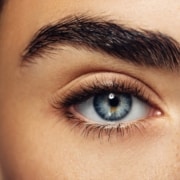5 things your eyes say about your health
We’ve all dealt with something about our eyes that have bothered us, whether it be redness and itching or swelling and watery eye.
Read on for some common conditions and when it may be time to seek medical attention for treatment.
- Redness is one of the most common eye problems, and it’s often related allergies. If both of your eyes are red, itchy and watery, allergies may be to blame and artificial tears or antihistamine eye drops can help alleviate symptoms. If these don’t provide relief, see your doctor to explore what else may be causing this problem.
- Dry eye is a common eye problem that could be caused by environmental factors, aging, hormonal changes and everyday activities. Some medical conditions and medications can cause it as well. Screen time, reading, watching TV for long periods of time without blinking enough to lubricate the eye can cause dry eye. Artificial tears often help provide comfort and relieve symptoms, but you may need to talk to your doctor if you can’t get relief.
- Pink eye or acute conjunctivitis can look like dry eye or another eye condition but it is a contagious eye condition. Your eyes look red and feel itchy and may ooze discharge. It’s often found in people who have cold symptoms or a runny nose. Your doctor can prescribe the best medication to treat pink eye, which should last no more than a week to 10 days.
- Eye strain is usually caused by staring at a computer or phone screen all day. It’s important to take regular breaks to give your eyes rest. Follow the 20/20/20 rule by looking at an object at least 20 feet away for 20 seconds every 20 minutes. Also try artificial tears to help with lubrication and talk to your doctor if you can’t get relief.
- Eye twitch is common and usually nothing serious, unless you are experiencing it for a long period of time with other symptoms like other parts of your face twitching. That’s when you should seek medical attention. Otherwise, it’s usually linked to too much caffeine and stress or too little sleep. Start with lifestyle changes first to see if symptoms improve.
If you are concerned about your eye health, call 808.955.3937 for an appointment with Dr. Maehara.










